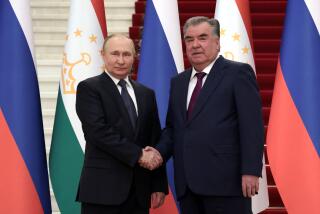Gorbachev Urges U.N. Afghan Effort : Gandhi, Soviet Leader Seek Action to Shape Government in Kabul
- Share via
NEW DELHI — Soviet President Mikhail S. Gorbachev urged U.N. Secretary General Javier Perez de Cuellar on Sunday to move quickly to try to win agreement among the parties in Afghanistan on a future government for that war-torn country.
In a joint statement with Indian Prime Minister Rajiv Gandhi at the close of a three-day visit here, the Soviet leader said that Perez de Cuellar should move “without delay” to follow up on the recent U.N. General Assembly resolution on Afghanistan, “which emphasizes the need for an intra-Afghan dialogue for the establishment of a broad-based government.”
The call for more intensive diplomatic efforts followed a blunt warning from the Soviet leader Saturday that Pakistan and the United States are inviting “grave consequences” by what he said is their subversion of the Geneva accords on Afghanistan.
New Soviet Initiative
The statements over the past two days highlight a new Soviet initiative, apparently designed to try to reach agreement on a future government for Kabul and avoid a potentially bloody confrontation of anti-government guerrillas and the Afghan military after the withdrawal of Soviet forces.
Moscow recently has increased military assistance to Kabul and has used advanced warplanes to attack anti-government guerrillas around the besieged southern city of Kandahar.
At the same time, according to well-informed diplomats and Soviets in the Afghan capital of Kabul, Moscow has shown a new willingness to try to find a diplomatic solution to head off potential chaos on its southern border after Feb. 15, the date all Soviet troops are to be out of Afghanistan under the Geneva accords.
Sunday’s joint Indo-Soviet statement also said a U.N.-supported international conference on Afghanistan may be necessary, reiterating a theme raised several weeks ago by the government of President Najibullah in Kabul.
Support for Najibullah
Gorbachev returned to the Soviet Union on Sunday. In brief remarks to reporters at departure ceremonies for Gorbachev and his large entourage, Gandhi said the Soviet leader demonstrated continued support for Najibullah during private talks over the last three days.
Afghan guerrilla leaders in Peshawar, Pakistan, have remained adamant in their refusal to include any prominent figures from the Najibullah government in a future Afghan government.
The two leaders and their aides also signed accords calling for two Soviet nuclear power plants to be built in India, for Soviet assistance on Indian thermal power stations, for cooperation on space and technological research and for economic cooperation.
The agreement on nuclear plants calls for the Soviet construction of a power station in southern India consisting of two 1,000-megawatt reactors. In addition to building the reactors, Moscow is to provide concessional financing and enriched fuel for the life of the power station.
The agreement, according to outlines made public, indicates that India has agreed to strict Soviet controls over nuclear fuels, a problem that India has experienced previously on potential nuclear power agreements with Moscow.
Gorbachev made few public appearances during the visit, his second to India in two years. On Sunday, the Associated Press reported, he canceled his unveiling of a statue of the 19th-Century Russian poet Alexander Pushkin.
The announced reason was that Gorbachev needed more time with Gandhi, but a police officer at the unveiling said the real reason was concern over security.
More to Read
Sign up for Essential California
The most important California stories and recommendations in your inbox every morning.
You may occasionally receive promotional content from the Los Angeles Times.









